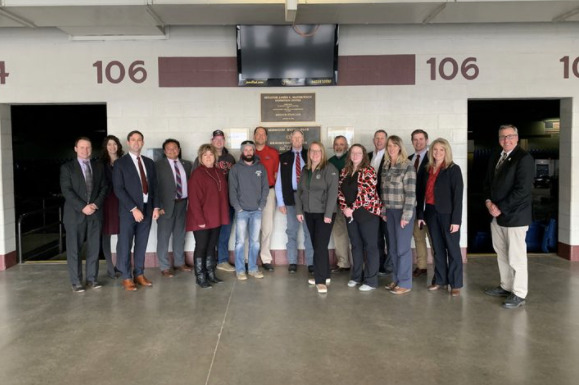 Representatives from across the state, along with Lt. Governor Mike Kehoe and Missouri Department of Agriculture Director Chris Chinn, came together earlier this month for the first meeting of the Missouri Food Entrepreneur Network (Mo-FEN).
Representatives from across the state, along with Lt. Governor Mike Kehoe and Missouri Department of Agriculture Director Chris Chinn, came together earlier this month for the first meeting of the Missouri Food Entrepreneur Network (Mo-FEN).
Two Northwest Missouri State University leaders, Jill Brown, director of corporate relations and major gift officer, and Rod Barr, school of ag science director, are committee members of the network. Other university representatives are from the College of the Ozarks, Lincoln University, Truman State University, Southeast Missouri State University, University of Central Missouri, Missouri State University and University of Missouri.
Mo-FEN is an arm of the Show Me Food, Beverage & Forest Product Manufacturing Initiative, which began in 2019 to advance new food processing and manufacturing projects in Missouri. Overall, these sectors and the value-added industries that support them represent a significant portion of the economic life throughout much of Missouri, nearing 30 percent of the state’s total economy.
In a tremendous show of support for the state’s agriculture, food and forest industry, representatives from the eight colleges and universities attended the meeting to discuss ways to increase opportunities for Missouri ag producers.
The initiative is in its infancy stage, according to Barr, with much of their energy and time compiling the current resource inventory across the university landscape. He noted the survey of course work and facilities with possible entrepreneur development in their respective areas. The group’s guide comes from two studies, 140 and 20 pages each, from the Missouri Department of Agriculture which can be found on the agriculture.mo.gov website.
At the beginning of the consortium in 2019, the listening session topic that was tackled was Missouri’s beef packing industry realizing the need to increase the capacity to 5,000 head per day. From those efforts, the scope was broadened to speak to other value-added products such as corn and soybean production of ethanol and biodiesel and forest production to produce furniture and barrel staves. Specialty crops from hemp to fruits and vegetables would also allow for value-added production in the state. Discussions involved the creation of community test kitchens, possibly within public schools after the school day hours, where entrepreneurs could work with their product in a pre-approved setting.
Another listening session discussion topic was the commercial trucking industry challenges across the state; plus the need for the access of affordable broadband. Further into the group’s study, it was determined the creation of regional processing and preservation equipment was needed, where Northwest Missouri State University Ag Learning Center was cited for proposed crop and livestock processing. Other examples included livestock processing capacity at the University of Missouri, dairy processing in Southwest Missouri, grape and wine processing at Missouri State University, specialty crop processing in the bootheel and grain and biofuel processing in Northern Missouri.
Workforce issues reared its head during one of the sessions noting the need for individuals knowledgeable to many issues common for manufacturing, including trainings and schools for worker safety, large equipment operation, logger safety, commercial driver’s license, food safety and HACCP, and good agriculture, laboratory and manufacturing practice to name a few. Once again, universities and trade schools would be necessary to train the workforce.
The next meeting of the Mo-FEN group will be in March at Lincoln University, where the topic to be considered will be what tools are needed to build a state-wide network, what are the current regulations and requirements through the University of Missouri food processing authority, creating a state map of assets and specialists and other topics to achieve the three-year goal of compiling and accessing all information.




Facebook Comments